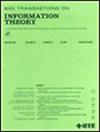A General Method for the Development of Constrained Codes
IF 2.2
3区 计算机科学
Q3 COMPUTER SCIENCE, INFORMATION SYSTEMS
引用次数: 0
Abstract
Nowadays there are several classes of constrained codes intended for different applications. The following two large classes can be distinguished. The first class contains codes with local constraints; for example, the source data must be encoded by binary sequences containing no sub-words 00 and 111. The second class contains codes with global constraints; for example, the code-words must be binary sequences of certain even length where half of the symbols are zeros and half are ones. It is important to note that often the necessary codes must fulfill some requirements of both classes. In this paper we propose a general polynomial complexity method for constructing codes for both classes, as well as for combinations thereof. The proposed method uses the Cover enumerative code, but calculates all the parameters on the fly with polynomial complexity, unlike the known applications of that code which employ combinatorial formulae. The main idea of the paper is to use dynamic programming to perform calculations like: how many sequences with a given prefix and a given suffix length satisfying constraints exist. For the constraints under consideration, we do not need to know the entire prefix, but much less knowledge about the prefix is sufficient. That is, we only need a brief description of the prefix.约束码开发的一般方法
现在有几种不同应用的约束代码。可以区分以下两大类。第一类包含带有局部约束的代码;例如,源数据必须用不包含子字00和111的二进制序列编码。第二类包含具有全局约束的代码;例如,码字必须是一定偶数长度的二进制序列,其中一半是0,一半是1。重要的是要注意,通常必要的代码必须满足两个类的某些需求。在本文中,我们提出了一种通用的多项式复杂度方法来构造这两类及其组合的码。该方法采用Cover枚举代码,但与该代码使用组合公式的已知应用不同,该方法以多项式复杂度动态计算所有参数。本文的主要思想是使用动态规划来执行如下计算:存在多少具有给定前缀和给定后缀长度的序列满足约束。对于所考虑的约束,我们不需要知道整个前缀,但对前缀的了解少得多就足够了。也就是说,我们只需要对前缀进行简要描述。
本文章由计算机程序翻译,如有差异,请以英文原文为准。
求助全文
约1分钟内获得全文
求助全文
来源期刊

IEEE Transactions on Information Theory
工程技术-工程:电子与电气
CiteScore
5.70
自引率
20.00%
发文量
514
审稿时长
12 months
期刊介绍:
The IEEE Transactions on Information Theory is a journal that publishes theoretical and experimental papers concerned with the transmission, processing, and utilization of information. The boundaries of acceptable subject matter are intentionally not sharply delimited. Rather, it is hoped that as the focus of research activity changes, a flexible policy will permit this Transactions to follow suit. Current appropriate topics are best reflected by recent Tables of Contents; they are summarized in the titles of editorial areas that appear on the inside front cover.
 求助内容:
求助内容: 应助结果提醒方式:
应助结果提醒方式:


